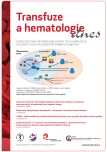-
Medical journals
- Career
Protilátka anti-K blokující vyšetření antigenu
Authors: J. Tylečková; K. Tůmová; H. Lejdarová
Authors‘ workplace: Transfuzní a tkáňové oddělení, FN Brno
Published in: Transfuze Hematol. dnes,29, 2023, No. 2, p. 142-145.
Category: Case Reports
doi: https://doi.org/10.48095/cctahd2023prolekare.cz7Overview
Haemolytic disease of the foetus and new-born due to anti-K antibodies is rare, but can cause severe foetal anaemia. Correct evaluation of immune-haematological tests is essential for providing proper treatment. One of the complications of laboratory testing can be a false negative result of erythrocyte antigen typing in a sample of foetal or new-born blood, due to an antibody blocking the antigen. This can be suspected in the event of a strongly positive direct antiglobulin test and the absence of the antigen corresponding to the identified antibody. This case report describes the situation we encountered when preparing an intrauterine transfusion for a pregnant woman with a Kell positive foetus and an anti-K antibody.
Keywords:
haemolytic disease of the foetus and new-born – red blood cell antibodies – blocked antigen – maternal anti-K
Sources
1. Masopust J, Banzetová H, Dušková D, Pejchalová A, Písačka M, Štolba P. Prenatální a postnatální imunohematologické vyšetření. Transfuze Hematol Dnes. 2008; 1 : 7–18.
2. Vaughan JI, Manning M, Warwick RM, Letsky E, Murray NA, Roberts I. Inhhibition of erythroid progenitor cells by anti-Kell antibodies in fetal alloimmune anemia. New Engl J Med. 1998; 19 : 798–803.
3. Hitoshi O, Denomme GA, Shoichi I, Atsushi I, Nollet KE, Hiroyasu Y. Three non-classical mechanisms for anemic disease of the fetus and newborn, based on maternal anti-Kell, anti-Ge3, amti-M, and anti-Jra cases. Transf Apher Sci. 2020; 59 (5): 102949. Publikováno elektronicky 2020 Sep 16. PMID: 32994126.
4. Keneth JM. Kell aloimunizace matky může vést k rozvoji anémie plodu. Gynekologie po promoci. 2009; 1 : 24–31.
5. Daniel G, Hadley A. Causes of fetal anemia in hemolytic disease due to anti-K. Transfusion. 2003; 43 (1): 115–116.
6. Slootweg YM, Lindenburg IT, Koelewijn JM, Kamp IL, Oepkes D, Haas M. Predicting anti-Kell mediated hemolytic disease of the fetus and newborn, diagnostic accuracy of laboratory management. Am J Obstet Gynecol. 2018; 219 (4): 393e1-393e8. Publikováno elektronicky 2018 Jul 29. PMID: 30063 902.
7. Delaney M, Matthews DC. Hemolytic disease of the fetus and newborn: managing the mother, fetus and newborn. Am Soc Hematol Educ Program. 2015; 2015 : 146–151.
8. Jain A, Kumawat V, Marwaha N. Blocked D phenomenon and relevance of maternal serologic testing. Immunohematol. 2015; 31 (3): 116–189.
9. Lee E., Redman M, Owen I. Blocking of fetal K antigens on cord red cells by maternal anti-K. Transfusion Med. 2009; 19 : 139–140.
10. Novoselac J, Raos M, Tomac G, Lukić M, Golubić Čepulić B. K antigens on neonatal red blood cells blocked by anti-K with titer of 32. Immunohematol. 2020; 35 (2): 54–57.
11. Lee E. Blocked D phenomenon. Blood Transf. 2013; 11 (1): 10-11.
12. Raos M. Blocked K antigen. Immunohematology Case Studies 2019. Transfusion Medicine Division Clinical Department of Transfusion Medicine and Transplantation Biology University Clinical Hospital Zagreb; dostupné z https: //www.isbtweb.org/fileadmin/user_upload/3_Raos_ISBT_Immunohematology_WP_Case_Study_2.pdf)
13. Koelewijn JM, Vrijkotte TGM, Haas M, Schoot CE, Bonsel GJ. Risk factors for the presence of non-rhesus D red blood cell antibodies in pregnancy. Int J Obstetr Gynaecol. 2009; 116 : 655–664
Labels
Haematology Internal medicine Clinical oncology
Article was published inTransfusion and Haematology Today

2023 Issue 2-
All articles in this issue
- Molekulární patofyziologie ribozomopatií – onemocnění s narušenou funkcí ribozomů
- Jak klinicky interpretovat výsledky TP53 analýz u chronické lymfocytární leukemie v kontextu dostupných terapeutických režimů
- Zmeny v diagnostike a liečbe venookluzívnej choroby pečene u detí
- rFVIIIFc v léčbě hemofilie A z pohledu reálné klinické praxe tří center pro léčbu hemofilie v České republice
- Protilátka anti-K blokující vyšetření antigenu
- Standardizace PET/CT u pacientů s mnohočetným myelomem – Společné doporučení České myelomové skupiny a České společnosti nukleární medicíny
- Vzácné choroby provázené hypergamaglobulinémií a zánětlivými projevy aneb „diagnostikovat jednotku, o níž nevíme, že existuje, asi není možné…“
- Cena České hematologické společnosti za nejlepší původní vědeckou práci a monografii v oboru hematologie v roce 2022
- Prof. Milan Bláha – 85. narozeniny
- Léčba pacientů s Hodgkinovým lymfomem po relapsu nebo progresi onemocnění – chemosenzitivita, transplantace a cílená léčba
- Transfusion and Haematology Today
- Journal archive
- Current issue
- Online only
- About the journal
Most read in this issue- Jak klinicky interpretovat výsledky TP53 analýz u chronické lymfocytární leukemie v kontextu dostupných terapeutických režimů
- Protilátka anti-K blokující vyšetření antigenu
- Standardizace PET/CT u pacientů s mnohočetným myelomem – Společné doporučení České myelomové skupiny a České společnosti nukleární medicíny
- Molekulární patofyziologie ribozomopatií – onemocnění s narušenou funkcí ribozomů
Login#ADS_BOTTOM_SCRIPTS#Forgotten passwordEnter the email address that you registered with. We will send you instructions on how to set a new password.
- Career

